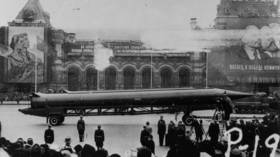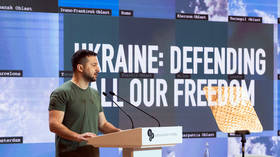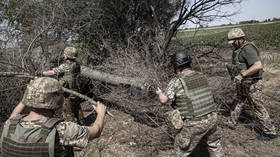Timofey Bordachev: Attempts by the US to force the global community to back its position on Ukraine have failed

Been there, done that. This is not the Cold War, and Russia is not the Soviet Union. One of the signs of the changes taking place today is not the division of the world into opposing camps, but rather the adjustment to changing conditions resulting from a great power conflict.
This could very probably be a signal that, in the future, we will not see the restoration of the bipolar international order which existed from 1945 to 1990.
The stance taken by most of the world on the conflict between Russia and the West shows that humanity is now far more united and capable of adapting, even to major challenges that may not have been envisaged just a short time ago. It belies the notion that American centrality in world affairs continues to make any issue related to Washington the most important one in the world and capable of causing a global split.
That doesn’t mean Russia should think that, by being on the right side of history, it will automatically secure the support of the majority of states. This is something that remains to be fought for.
It would be reckless to assume that the refusal of the majority of the world’s nations, representing 85% of the global population, to join the West’s economic war against Russia means support for Moscow’s behavior.
Six months after the start of the military operation in Ukraine, the dynamics of international attitudes towards the politico-military conflict and its participants show that most countries are keen to distance themselves.
The exception here is China, whose policy is increasingly pro-Russian and, as its own problems with the US escalate, it continues to show the real depth of mutual trust between Moscow and Beijing.
However, this relationship is derived from the development of the two countries over the past 20 years and the objective convergence of their approaches to major systemic problems – i.e. it’s not linked to the immediate crisis in Europe.
It is, of course, too early to tell what the international order will look like in the future, after the West is forced to admit its historic defeat in the struggle to maintain global dominance. It will be shaped gradually as the leading powers, often in very dangerous ways, define the limits of their power capabilities and the limits of what is permissible.
This process, given the irrationality of a major general war and the scale of longstanding problems, is likely to be much more protracted than previous episodes of radical change in the international order. We are now witnessing one of the first stages of a lasting global political realignment. We are, in fact, talking about the end of a period that has lasted several hundred years.
But even at this stage, we can already see some signs of the behavior of powers that will be systemic factors in the development of international politics. It is therefore important that one sign of the changes taking place is not the division of the world into opposing camps, but instead – for the most part – adjustment to the changing conditions resulting from the conflict.
This could very probably be a signal that we do not run the risk of restoring the bipolar system that characterized the international order of the Cold War period. And we can make an additional argument that the rules and norms of behavior of that time can only serve as a lesson for our foreign policy in the modern era.
The flagship of such adaptation is of course India, one of the largest states in terms of population, which has very serious ambitions in terms of its role in the world. So far, it has not achieved the economic, military or human development that would make it a true great power. But at the same time, India is the leader of a majority that has no intention of letting itself be divided into opposing camps or of becoming a resource base for a rival like America, Russia or China. New Delhi has consistently maintained a business relationship with Moscow and has become one of Russia’s biggest foreign trade partners in recent months.
Indian officials constantly stress that their worldview is not anti-Russian and the reticence in some areas regarding cooperation with Russia is related only to a well-founded fear of domestic business concerns being exposed to US reprisals.
India is seen as a role model by most developing countries in Asia, Africa and Latin America. We see in particular that, six months after the Russia-West crisis turned into a politico-military clash, the number of countries willing even verbally to support the US in its fight against Moscow has more than halved.
Thus, last week, observers’ attention was drawn to an attempt to rally the support of UN countries around a new statement condemning Russia’s policy on the Ukraine issue. While more than 140 countries supported a similar resolution at the UN General Assembly in March, only 58 followed up this time.
A total of 30 of those are formal members of the US-led NATO military bloc and several more are bound to Washington by bilateral defense treaties.
Thus, more than two-thirds of the entire international community have avoided outlining their position on European affairs. This is, of course, partly a result of Russian and Chinese diplomacy, constantly pointing out that the real cause of the war in Europe is US policy.
But this dynamic shows first and foremost that developing countries understand there are opportunities for them not to make such a choice. Instead, a strategy of distance from the conflict is more rational and justified in the current context. And, as affairs in Europe drag on and take on the features of a permanent conflict between Russia and the West, with varying degrees of tension, most of the world will increasingly adapt to life in these circumstances.
For the US itself, the reduction of its capacity to impose its will has led to a strategy of intimidation and pressure on independent players in the international community.
However, this policy won’t be successful either. Even though Washington has an enormous repressive machine at its disposal, turning all its international activities into the enforcement of “sanctions” would make it completely ineffective.
That said, we certainly cannot rule out such a scenario. As a result, more and more countries will cooperate with both Russia and the West, and the pace of this cooperation will depend on the possibility of getting something from these two adversaries.
In turn, the conflict in Europe will become increasingly localized and of direct interest only to the main participants. What the rest of the world is doing is trying not to participate.
For Russia, this means it needs to remain open and able to offer developing countries what they require – in the areas of energy, goods, science or education. But there is absolutely no need to lure anyone into the struggle for Russian interests and values – exactly what most of the world wants to avoid.
Thus, we can be relatively calm – the division of the world into opposing camps, which is an integral condition for the outbreak of a larger war, will be avoided.















